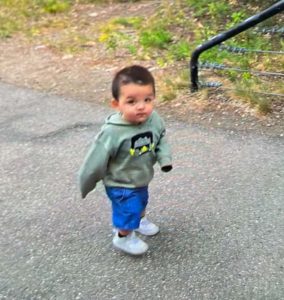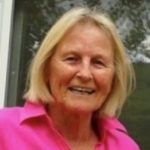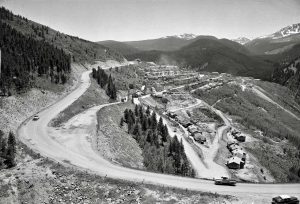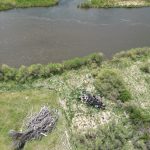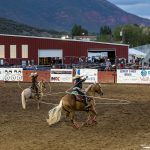Another second chance: EagleVail’s Chris Del Bosco, a three-time Canadian Olympian, will finish career competing for U.S.
EagleVail raised ski cross star hopes to spearhead formation of a U.S. team

Mark J. Terrill/AP Photo
Chris Del Bosco’s career has been defined by second chances.
Growing up in EagleVail to an American mother and Canadian father, the natural athlete gravitated toward ski racing — and the party scene attached to it. After positive marijuana tests eradicated two national titles, he was kicked off the U.S. development team.
At 21, “he was discovered drunk in a ditch, dangerously cold and with a broken neck,” and by the fall of 2005 “he was drinking every day” according to a 2009 The Globe and Mail story. His sister Heather helped him finally seek treatment, and he was clean in 90 days. A few weeks later, he claimed a ski cross X-Games bronze, a win that convinced him to dabble with drugs again. That led to yet another drinking and driving charge.
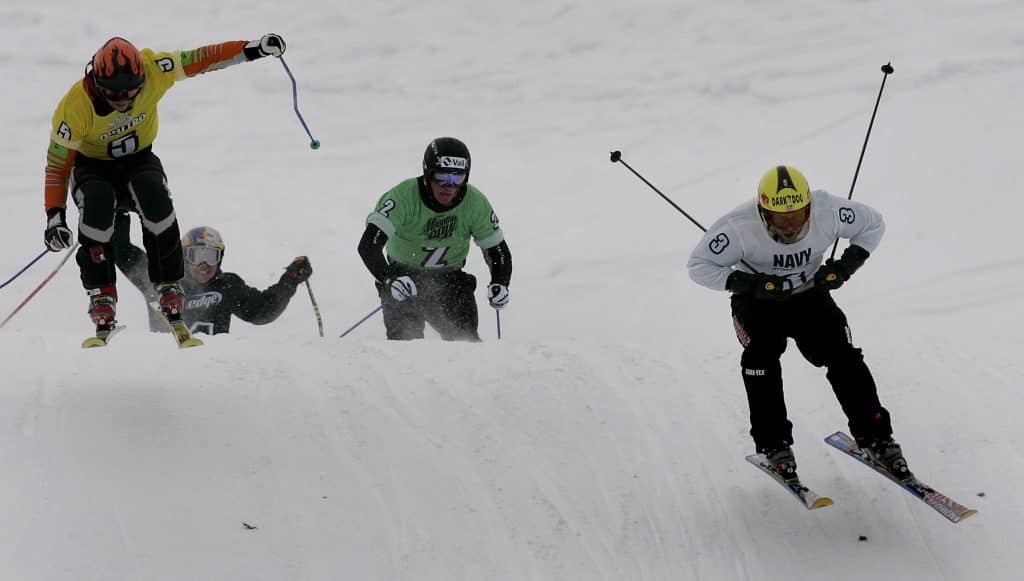
Charlie Riedel/AP photo
“I kind of ended the dream — I thought,” he reflected 16 years later from his Whistler home base.
He quit drinking on Sept. 6, 2006. Soon after, Cam Bailey – busy recruiting members for Canada’s first ski-cross team in advance of hosting the 2010 Vancouver Olympics — decided to take a chance on the promising, but risky, talent.

Support Local Journalism
The rest is history: 26 World Cup podiums, 10 World Cup wins, one World Championship gold, three Olympic appearances and five X-Games podiums over the course of a 15-year ski cross career that essentially spans the sport’s entire international existence.
While his “first” second chance jumpstarted his athletic life, the second one presumably will bring it to a close. Last spring, the 40-year-old quietly made a nation-change request with FIS, opening the door for another shot to race for the red, white and blue in 2022-23.
“It’s kind of been on my radar for a long time — I’ve always thought about the potential of coming back and finishing things out and racing for the U.S.,” he said, adding that he hopes to “bring recognition back to the sport in the U.S.” and “be a force” in starting an official U.S. Ski and Snowboard supported team.
“It’s kind of two-fold,” he said of his career-change calculus. “A personal dream and also maybe to create a legacy and create a program in the U.S.”
Making the switch
A four-time ski cross overall World Cup runner-up (2009, 2010, 2011 and 2016), Del Bosco finished last season ranked 35th in the final season standings, the sixth-best Canadian.
“Had some benchmarks that I needed to meet with the team in Canada over the last couple of years and was just a little bit short,” Del Bosco, the only Canadian ski cross male to be a World Champion, said of his status with the country that has claimed seven of the 24 Olympic medals in the sport’s young history.
Del Bosco didn’t feel like his performance had really slipped all that much, especially when evaluated in light of a sport where slim margins and a little luck can be the difference between racing in a small final and going home unheralded.
“Once you’re there, things can totally change,” he said regarding ski cross’ finicky nature. “I think the skiing is there, but I just didn’t quite meet those benchmarks, and I saw it as an opportunity to kind of push towards other goals.”
In April, he started the process of a nation-change request through FIS and started talks with U.S. Ski and Snowboard.
“In order for it to go smoothly, you need permission from the country you’re leaving and the one you’re transferring to,” he explained. “Both the Canadian and the U.S. side were amazing in getting that transfer paperwork done and supported that move.”
“No matter where Chris’s career takes him, I hope he knows what he did for the sport, from inventing the “cowboy” to proving that longevity in ski cross is possible,” Stanley Hayer, Canada’s head coach, told SkiRacing.com in October.
“Chris deserves the utmost respect from all involved in ski cross for his Canadian career and I am looking forward to seeing what he can do moving forward with the US Ski Cross team.”
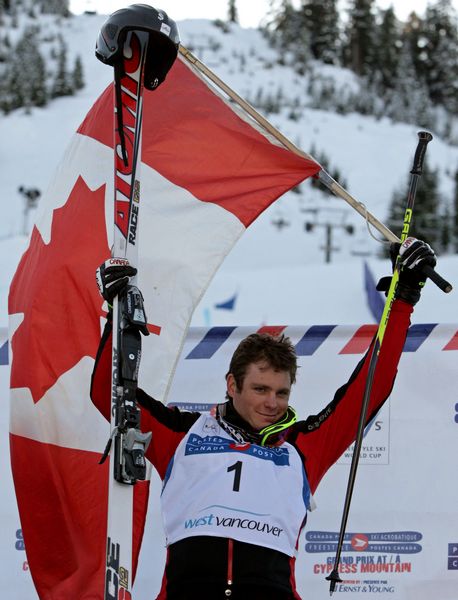
Paul Chiasson/AP photo
“He went to bat for me,” Del Bosco said of Hayer, adding that program director Dave Ellis and others at the Canadian Snowsports Association were helpful with the transfer, which, in and of itself represented an emotionally ironic narrative reversal in some respects.
“They helped me with the transfer and they were instrumental in the beginning in 2007 to make sure everything was in line when I came to race for Canada,” Del Bosco said. “So, it was kind of bittersweet that they had to do that, but they realized why I was doing it and were supportive of why I was doing it.”
Receiving Canada’s blessing makes sense — if their longtime leader can spearhead a program in the U.S., it’s better for everyone in the World Cup circuit, especially the North American teams.
“They see a lot of potential in regards to getting a U.S. team and how it would help their side as well with a bigger North American presence.”
What comes first: the chicken or the egg?
The current situation Del Bosco faces with trying to start a program with USST is the polar opposite to the one that saved his career in 2007.
“It’s that classic, you don’t have the results, so there’s no funding, but you need the funding to get the results,” he said. “So, you’re kind of lost in that cycle.”
“With the Canadian team at the beginning, that’s what we had — the support,” he continued.
“All they did was basically put us together to train together and push each other and support us, … and that was kind of the recipe. And it seems like that’s the recipe around the world, and it’s really hard to get those results on your own when you don’t have that support.”
There have been some encouraging signs, Del Bosco said, after speaking with USST’s director of sport.
“It’s on their radar to try and figure out how to integrate it into the program,” he said, pointing to the potential for another Olympic medal — should the team ski cross event be added to the Games’ program — as being one incentive.
“And also the fact that every other major ski power in the world has a pretty solid ski cross program. The U.S. is kind of the only one (that doesn’t).”
In his mind, the formation of a team could also have development pipeline ramifications.
“I see it as just another avenue to keep people in the sport,” he said. “In Canada, we brought a few guys over from (the) NCAA — they still wanted to be in the sport, came over and had success in ski cross. It’s not a huge sport, so I think we need to kind of do whatever we can to keep people in it.”
Del Bosco doesn’t believe starting a U.S. Ski and Snowboard-supported ski cross team is a Sisyphean endeavor; in fact, he is “more hopeful than any time in the past.”
“Some people have kind of said, ‘Yeah good luck,'” he said regarding his venture. “I think there’s some people in charge of the team now that see a value in it and see a potential.”
Del Bosco described how during his Canadian tenure, coaches and fellow athletes often spoke of the U.S.’s ever-present “depth and talent pool,” for the sport, should they decide to jump in with both feet — as Canada did before their home Olympics.
“If we decided to get serious and put some support behind it, I think we’d be dangerous and we’d be pretty successful,” Del Bosco said. “I’m not the only one; there’s definitely been other people who’ve been working on it behind the scenes.”
One is Tyler Wallasch.
Self-funded ski cross
The lone American at the Bejing Olympics, Wallasch finished the 2022 season ranked 25th in the overall World Cup standings and was 28th in Beijing. The 28-year-old Mammoth Mountain Ski and Snowboard Club product is currently Del Bosco’s training partner.
“He’s just on the cusp of breaking through,” Del Bosco said. “The hope is that maybe I can help that and kind of help him get to that next level. If we can put a few results together, I think that will definitely help the conversation and kind of keep moving things forward.”
The pair just returned from a three-week training block in Norway and Italy. As of right now, their World Cup dreams are completely self-supported — with a key assist from the German ski cross team, which has allowed the pair of Americans to join them for training camps. The Germans also support them in logistical manners during the long European stretches on the World Cup calendar.
“I think they see a value in that and they’re doing everything they can to help us, which is amazing,” Del Bosco said. Another American, Steamboat Springs’ Brant Crossan, has had a similar situation with the Austrians the past few years.
For some, the idea of leaving a well-funded, established super-power to embark on the living-out-of-a-suitcase World Cup life independently — especially in the twilight stages of an already satisfactory career — is perplexing. For the always “all-or-nothing” Del Bosco (who can forget his attempt to push from third to first in the 2010 Olympic final, a bold move which resulted in an unfortunate fourth) it’s par for the course.
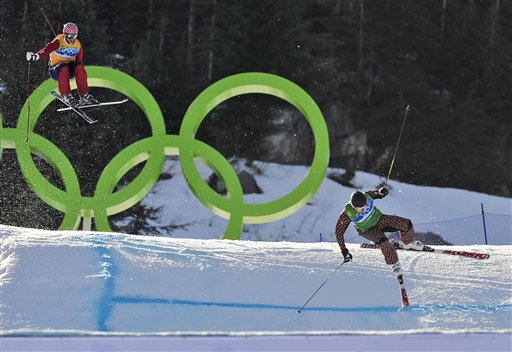
Mark J. Terrill/AP photo
“Really what it comes down to is that there’s a huge opportunity and I think I have a lot to offer,” he said. “It creates a whole new motivation. A whole new challenge.”
As he prepares to head back to Europe for his standard November Europa Cup litmus test events, Del Bosco said he’s “right where I want to be heading into a season.”
“I’m excited to see what I can do; it definitely doesn’t get easier as you get older, but I feel as good as I have heading into a season — probably haven’t felt this good for the past few years,” he said. “So, I’m hopeful. I’m really looking forward to the start in December and seeing what we can do.”
“I still feel like I can be on the podium, so that’s the goal.”
His girlfriend, reigning Olympic silver medalist Marielle Thompson, will still be a trustworthy beacon of support, even though the couple’s “life on the road” will look a little bit different this season.
“She wants me to chase my dreams as well,” he said.
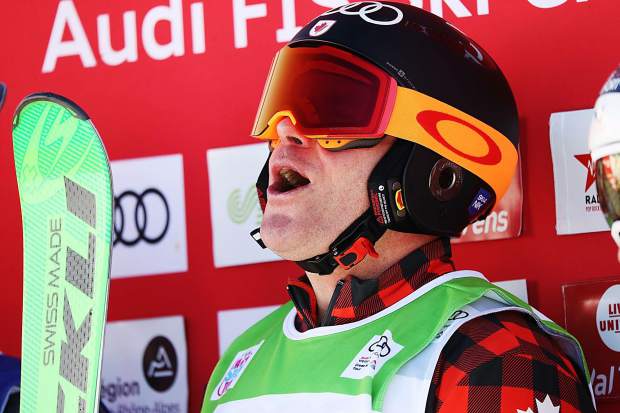
Special to the Daily
As his career enters its final chapter, Del Bosco has reflected on those who’ve helped bring him to where he is.
“There’s been a lot of people that have jumped on to support this,” he said, even pointing back to an old American Alpine-racing friend, Fred Emich, who raced for Battle Mountain High School and eventually, Middlebury.
“Now he’s in that position where he can help,” Del Bosco said regarding Emich Automative’s aid. It’s amazing that you know a lot of these friends I grew up racing with are now in a position to help this next chapter. It wouldn’t be possible without this kind of assistance.” Those interested in supporting Del Bosco can visit his World Cup Dreams Foundation link at WorldCupDreams.org/c-delbosco.
As the World Cup opener in Val Thorens (FRA) Dec. 7-8 quickly approaches, the veteran also contemplated how his journey — catalyzed by second chances — has reached a harmonious resolution.
“The legacy I’d want to leave would be just as someone who made the most of that second opportunity,” he said.
“When I was given that chance, I just wanted to do everything I could to make the most of it and hopefully inspire some people to follow in my footsteps.”
“It’s kind of cool to see that come full circle and work with those guys and try and help that next generation get to that next level,” he continued.
“And now, I think I have a lot to offer on the U.S. side, so, hopefully I can continue building that.”

